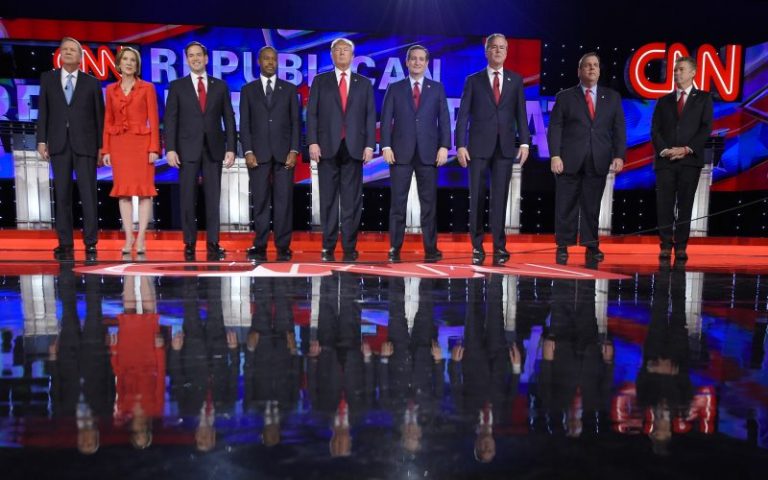The Republican National Committee will require presidential candidates to attract 40,000 individual campaign donors and the support of at least 1 percent of voters in multiple national polls to qualify for the first debate with Fox News in Milwaukee this August, according to four people briefed on the plans.
The filter, which also requires candidates to pledge support for the party’s eventual nominee, are stricter than similar rules Democrats adopted to set their own first debate stage in 2019, when 20 candidates met over two nights. Democrats allowed candidates to qualify either by meeting a 65,000-donor threshold or by getting 1 percent in at least three early state or national polls.
Republicans, by contrast, will require both a donor and a polling standard. The polling standard requires a candidate to be at 1 percent nationally in multiple polls that are deemed credible by the RNC. One person briefed on the plan said there may be an option to use state polls as well if candidates can get more than one national poll showing them at 1 percent.
“Debates are not a vanity project but a critical opportunity to find the next President of the United States. If you can’t find 40,000 unique donors to give you a dollar and at least 1 percent of the primary electorate to support you, how can you expect to defeat Joe Biden?” RNC Chairwoman Ronna McDaniel said in a statement.
The rules could be challenging for the less-well-known candidates, including former Arkansas governor Asa Hutchinson and California talk radio host Larry Elder, who have not been listed by name in some national polls.
The RealClearPolitics average of national polls currently lists six candidates as polling above 1 percent in national surveys: former president Donald Trump, Florida Gov. Ron DeSantis, former U.N. ambassador Nikki Haley, former vice president Mike Pence, businessman Vivek Ramaswamy and Sen. Tim Scott (S.C.).
Other current or potential candidates, including New Hampshire Gov. Chris Sununu, former New Jersey governor Chris Christie, Elder and Hutchinson, average 1 percent or less.
Some candidates are concerned that the rules could sideline their campaigns at the starting gate. The first Republican debates of the 2016 campaign season included 17 candidates in two different events.
“It seems that the RNC is going out of its way to purposely narrow the field at one of the earliest times in the party’s history,” said a Republican consultant working for one of the presidential candidates who spoke on the condition of anonymity because they were not authorized to discuss the matter publicly. “And rather than finding a way for as many conservative voices to be heard by Republicans throughout the country, they are attempting to make this a two-man race.”
Republicans familiar with the process said they are seeking a standard that is not too high — but that also keeps the event from becoming a circus. The donor standard will rise for subsequent debates. RNC officials have argued that the national media, which has been covering the back-and-forth between Trump and DeSantis, is to blame for any impression that the nomination fight had become a two-person race.
Trump, as the polling leader, has suggested he may skip the early Republican debates. He has also said he will not pledge to support the eventual nominee no matter who the party selects. His team has been in negotiations with the party over debates, The Washington Post has reported.
Trump benefited from a large field of Republican competitors during the 2016 primaries, and he has recently praised some of his rivals, including Ramaswamy and Scott, as his campaign aides hope to keep opposition to his candidacy divided. DeSantis’s team, meanwhile, has made clear the Florida governor sees the race as a two-person contest.
Ramaswamy, a first-time candidate who has attracted support in early events, said his campaign already has the donors it needs to make the first debate stage. “We cruised past that a while ago. That’s in the rearview mirror,” he said during a recent interview.
Several more candidates, including Pence, Christie and North Dakota Gov. Doug Burgum, are expected to formally join the Republican nomination race in coming weeks.
Burgum, a former businessman with significant wealth who is not well known outside his state, said he “absolutely” will be able to meet the donor threshold, despite his plans to self-fund a portion of his campaign. Asked whether he could clear the 1 percent polling threshold, he said, “Yes.”
“There is some idea that this is going to be a completely self-funded thing. That’s completely false,” Burgum said in a recent interview. “I’ll invest in myself because I believe in myself.”
Advisers to Christie, Hutchinson, Sununu and Elder either declined to comment or did not respond to requests for comment.
The RNC will also require debate participants to sign data-sharing and fundraising agreements with the national party, and to pledge not to participate in any unsanctioned debates.
Maeve Reston contributed to this report.

